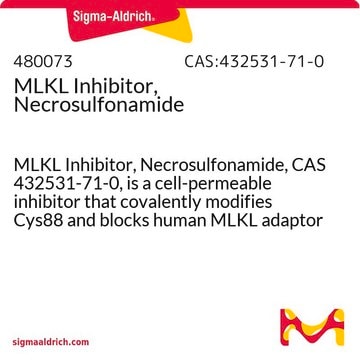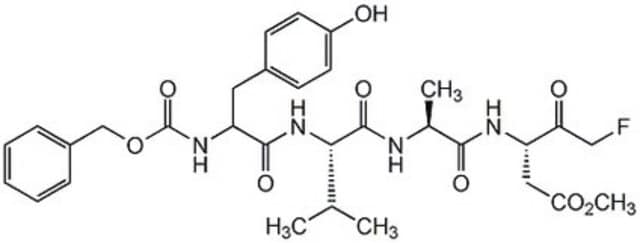V116
Z-VAD-FMK
≥98% (TLC), solid, Caspase inhibitor
Synonym(s):
N-Benzyloxycarbonyl-Val-Ala-Asp(O-Me) fluoromethyl ketone
About This Item
Recommended Products
product name
Z-VAD-FMK, solid
biological source
synthetic
Quality Level
Assay
≥98% (TLC)
form
solid
color
white
solubility
DMSO: 20 mg/mL
H2O: insoluble
storage temp.
−20°C
InChI
1S/C22H30FN3O7/c1-13(2)19(26-22(31)33-12-15-8-6-5-7-9-15)21(30)24-14(3)20(29)25-16(17(27)11-23)10-18(28)32-4/h5-9,13-14,16,19H,10-12H2,1-4H3,(H,24,30)(H,25,29)(H,26,31)/t14-,16-,19-/m0/s1
InChI key
MIFGOLAMNLSLGH-QOKNQOGYSA-N
Gene Information
human ... CASP3(836)
mouse ... CASP3(12367)
rat ... CASP3(25402)
General description
Application
- to induce mixed-lineage kinase domain-like (MLKL) phosphorylation (p-MLKL) in L929 cells
- to induce autophagy in Jurkat and K562 cells
- to revert killing effects of oxaliplatin or oxaliplatin combination with chloroquine (CQ) on HCT116 and SW620 cell lines
- as a caspase inhibitor to inhibit apoptosis and assess nuclear factor-kB, heat shock protein 70 (Hsp 70), proto-oncogene (cmyc) and tumor suppressor protein p53
Biochem/physiol Actions
Features and Benefits
Packaging
Caution
Storage Class Code
11 - Combustible Solids
WGK
WGK 3
Flash Point(F)
Not applicable
Flash Point(C)
Not applicable
Personal Protective Equipment
Certificates of Analysis (COA)
Search for Certificates of Analysis (COA) by entering the products Lot/Batch Number. Lot and Batch Numbers can be found on a product’s label following the words ‘Lot’ or ‘Batch’.
Already Own This Product?
Find documentation for the products that you have recently purchased in the Document Library.
Customers Also Viewed
Articles
Cell cycle phases (G1, S, G2, M) regulate cell growth, DNA replication, and division in proliferating cells.
Cell cycle phases (G1, S, G2, M) regulate cell growth, DNA replication, and division in proliferating cells.
Cell cycle phases (G1, S, G2, M) regulate cell growth, DNA replication, and division in proliferating cells.
Cell cycle phases (G1, S, G2, M) regulate cell growth, DNA replication, and division in proliferating cells.
Our team of scientists has experience in all areas of research including Life Science, Material Science, Chemical Synthesis, Chromatography, Analytical and many others.
Contact Technical Service















